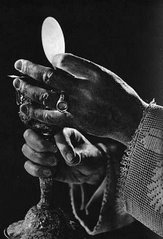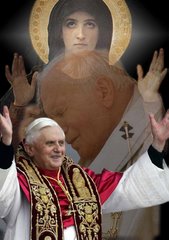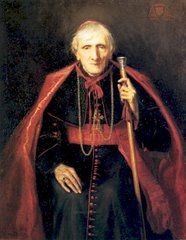In this letter Screwtape goes deeper into the subject of prayer by instructing Wormwood how to twist the prayer of the patient so that it becomes ineffective. The first way of accomplishing this is borne out of a reaction to the “parrot-like nature of his prayers in childhood.” That is, knowing that as children we simply ran through them without thought there is the temptation to jettison them altogether in favor of “free” prayer; that is prayer without structure in order to pray more genuinely. But methods of prayer are important but both have their pitfalls. The formal prayers can feel like a chore that we simply run through. The “free” prayers can be reduced to no prayers at all. Screwtape elaborates:
“(H)e (the patient) may be persuaded to aim at something entirely spontaneous, inward, informal, and unregularized; and what this will actually mean to a beginner will be an effort to produce in himself a vaguely devotional mood in which real concentration of will and intelligence have no part.”
This might seem silly at first; how could we be tempted by such a type of prayer? The problem for us is that very holy people probably can pull off simply being silent and let God flow into them. As we see in the saints the ability to pray like that and knowing that it is an incredible spiritual experience, we seek to immolate that without really knowing what we’re doing and so fall into simple laziness. Prayer, at least for beginners, needs to be directed to some extent by our will and intelligence and not just a mood. For some this probably means the “training wheels” of the formal prayers we learned as children, then perhaps of a mix of formal and free until we are capable of the highest arts of prayer.
Another thing that Lewis mentions is the importance of our bodies while praying. As Screwtape says, “they are animals and whatever their bodies do affects their souls.” As we know, there is an intimate connection between the body and the soul and so what Lewis is telling us makes sense. We need to watch our bodies during prayer. Perhaps this can mean kneeling longer or looking straight at the Blessed Sacrament more during Adoration so that our bodies can lead our hearts.
Screwtape then goes into how to misdirect the intention of prayer. The first way is to focus the patient not on God but on our own feelings:
“Keep them watching their own minds and trying to produce feelings there by the action of their own wills…When they say they are asking for forgiveness, let them be trying to feel forgiven. Teach them to estimate the value of each prayer by their success in producing the desired feeling; and never let them suspect how much success or failure of that kind depends on whether they are well or ill, fresh or tired, at the moment.”
One thing that comes out of this is the importance of the priest at Reconciliation in order to counter this tendency to simply make ourselves feel forgiven instead of actual forgiveness. Lewis, although an Anglican, was known for going to the Anglican equivalent of Confession more often than usual and so would probably agree on the value of having some else there. The other thing is that if prayer is selfish then it will fail. We cannot pray to “go feel better” though prayer can certainly help us to do that and ought to be our first resort if we are having trouble. Instead, we should pray to become closer to God and the offset of that will be that we feel better. If we focus on ourselves than we, not ourselves are directing the venture and so the value of the prayer as a prayer and a means to connect better with God is close to nil.
So we are to focus on God, but there is danger in that too. As Screwtape points out, our preoccupation with the physical can mislead us. When we think of God, we might think of a dove or the image of Christ or the crucifix in our bedroom. That is, physical depictions for a reality which (except for Christ) not physical and greater then are images. So while focusing on these images is better than not praying it still denies the fullness of truth that comes from God. What is this fullness and how do we achieve it? Believe it or not, Screwtape knows and warns Wormwood of the danger of it if it ever happens:
“For if he ever comes to the distinction, if he ever consciously directs his prayers ‘Not to what I think thou art but to what thou knowest thyself to be,’ our situation is, for the moment, desperate. Once all his thoughts and images have been flung aside or, if retained, retained with a full recognition of their merely subjective knature, and the man trusts himself completely real, external, invisible Presence, there with him in the room and never knowable by him as he is known by it-why then it is that the incalculable may occur.”
Screwtape then wants to avoid this lest God take it as far as He can so that the patient is lost to Screwtape and Wormwood forever. Therefore, we should strive to pray so that we do as Aristotle would say and contemplate not images of the divine or ourselves, but the divine Himself.
Next letter: a Mardi Gras treat as we go into the first letter dealing with war.
Sunday, February 18, 2007
Subscribe to:
Post Comments (Atom)






1 comment:
Excellent commentary, Michael. Keep 'em coming!
Post a Comment